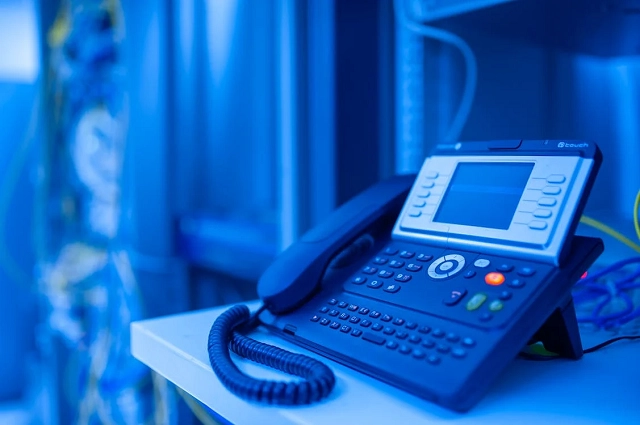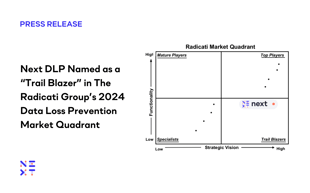Fortinet Acquires Next DLP Strengthens its Top-Tier Unified SASE Solution
Read the release
Voice over Internet Protocol (VoIP) tools allow healthcare providers to stay in touch with patients without divulging their personal phone numbers. Privacy is a tremendous benefit, but VoIP platforms also give providers additional benefits like call forwarding, remote connectivity, and cost savings.
However, because VoIP platforms support patient-provider communication, they process protected patient data. That’s why providers must choose a HIPAA-compliant VoIP solution that keeps patient data secure.
Google Voice is a popular VoIP tool that integrates with other tools in the Google suite, giving healthcare providers an all-in-one platform for efficient operations. But is Google Voice HIPAA compliant?
The short answer: Yes, Google Voice is HIPAA compliant, but only when used with a Google Workspace plan.
In this guide, we’ll assess how Google Voice complies with HIPAA regulations and offer tips for finding a compliant VoIP provider for your practice.
In this article:
 |
While the free version of Google Voice doesn’t comply with HIPAA, Google Voice for Workspace is HIPAA compliant. It isn’t possible to buy Google Voice as a standalone product; you have to get the paid Google Workspace suite, which starts at $10/month per user. The upside is that your practice gets access to multiple time-saving collaboration features in a single subscription.
This tool allows healthcare providers to send and receive phone calls and text messages over the internet instead of phone lines, giving you easier access to patients while on the go. Google Voice comes with various features, including:
Using Google Voice in healthcare can provide benefits such as cost-effectiveness and transcription services, but it also comes with risks and downsides. One of the main risks is the potential exposure of sensitive healthcare data.
Without encryption and proper access controls, voicemails and recordings containing protected health information (PHI) could be easily accessed or intercepted by unauthorized individuals. This poses a significant data security risk and can interfere with users' privacy.
While Google Voice can streamline tasks like patient calls and appointment reminders, it lacks a medical focus and may not provide the level of support needed in a healthcare setting.
Since Google Voice collects, stores, and shares patients’ protected health information, it must comply with HIPAA regulations. It does so in a few ways.
Google will sign a BAA to share the liability of HIPAA compliance with you, although it emphasizes that your practice is still responsible for common-sense protections on your end and how you use the platform. Google requires you to understand whether you need a BAA and to apply for one voluntarily if so.
Google requires you to have the BAA in place before using its products for processing PHI, so keep that in mind.
As always, how you use a platform is just as important as choosing a compliant platform from the start. Work with your compliance team or auditors to ensure your use of Google Voice complies with HIPAA and avoid potential penalties for non-compliance.
Google protects PHI by encrypting all calls, messages, and voicemails. It also does this while syncing calls, texts, and voicemails across your various devices, allowing providers to find a balance between on-the-go care and security.
Google Workspace allows you to manage all users’ access levels, which makes the platform HIPAA compliant. Keep in mind that this doesn’t apply to free Gmail accounts.
If you'd like to test-drive the platform, Google Workspace comes with a free 14-day trial. However, you need to pay for premium access to sign a BAA with the platform to be HIPAA compliant, so don’t process any PHI in a Google Workspace trial.
 |
Google Voice isn’t a healthcare-specific solution, so it might not have all the features your practice needs to communicate with patients.
Alternative HIPAA-compliant options like Spruce Health, RingCentral, Zoom for Healthcare, and Skype for Business provide secure communication solutions for the healthcare industry. These platforms ensure data security and compliance with HIPAA regulations.
Spruce Health is a HIPAA-compliant messaging platform that allows healthcare providers to communicate securely with patients. It offers features such as secure messaging, video visits, and appointment scheduling.
RingCentral is another option that offers HIPAA-compliant communication services, including voice, video, and messaging. Zoom for Healthcare is a video conferencing platform that provides secure and encrypted communication for healthcare professionals.
Skype for Business, now known as Microsoft Teams, also offers HIPAA-compliant features such as secure messaging, video conferencing, and file sharing.
These alternative options provide healthcare professionals with the ability to communicate with patients and colleagues securely while ensuring the privacy and security of sensitive patient information.
Whether you use Google Voice or another VoIP provider, look for these helpful features to ensure HIPAA compliance and business efficiency.
Any HIPAA-compliant vendor should be willing to sign a BAA. This shields you from liability in the event of a provider data breach. While it won’t completely shield your organization from liability, any reputable VoIP provider will offer to sign a BAA as part of their agreement to safeguard PHI.
The upside of a VoIP system is that it operates in the cloud, allowing providers to stay in touch with their patients even while away from their landline phones. While opting for VoIP is a smart backup strategy, a solid VoIP provider should also have backup and recovery plans in place.
Ask about their data loss backup systems. Automated backups and robust disaster recovery plans are also a must for HIPAA compliance.
Encryption is one of the most important HIPAA requirements for VoIP vendors. Look for providers offering end-to-end encryption for data at rest (stored data) and in transit (during calls). This security feature is crucial for protecting sensitive information from unauthorized access.
The paid version of Google Voice is HIPAA compliant when used with a BAA. However, it’s essential to consider the needs of your practice when choosing a VoIP platform. Google Voice offers a range of features for patient communication, but compliance ultimately depends on how you use this platform.
A compliant VoIP solution is a must-have for patient communications, but your organization is still at risk of falling out of compliance in other areas. The best way to shield yourself from data loss and liability is to opt for a robust data loss prevention and compliance solution like the Reveal Platform by Next.
Get unprecedented help with risk management, compliance, and more with our AI- and ML-powered solution. See Reveal in action now: Request your demo.
It’s not recommended. There’s always the risk of accidentally sharing PHI. Plus, these free accounts don’t offer HIPAA-compliant features or support BAAs, making them non-compliant for any healthcare-related communications.
Immediately follow your incident response plan. That will usually require:
Standard features include encryption and BAAs, but we also recommend looking for:

Blog

Blog

Blog

Blog

Resources

Resources

Resources

Resources

